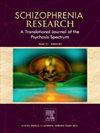Alterations in fatty acid metabolism in patients with schizophrenia in a multi-omics perspective
IF 3.6
2区 医学
Q1 PSYCHIATRY
引用次数: 0
Abstract
Background
Recent research has extensively explored the involvement of gut microbes in various fatty acid metabolic processes, elucidating their crucial roles in host energy homeostasis and metabolism. Nevertheless, there remains a dearth of studies examining the comprehensive profile of fatty acid metabolites in schizophrenia and their potential connection to gut microbes.
Method
Conducting a thorough investigation, this study scrutinized the gut microbiome composition of 63 individuals, consisting of 35 schizophrenia (SZ) patients and 28 demographically matched healthy control (HC) subjects. Feces and serum samples were meticulously collected, with stool samples subjected to 16S rRNA sequencing targeting region V4 and untargeted metabolomics analysis, while serum samples underwent untargeted metabolomics assessment.
Results
A total of 21 different genus-level species were identified in the SZ and HC groups. Predictive analysis of gut flora pathways revealed abnormal fatty acid degradation in schizophrenia. Notably, 17 differential fatty acid metabolites were found in feces, whereas 43 were found in serum fatty acid metabolites. A higher proportion of differential fatty acid metabolites were found in serum compared to those in feces. The predominant pathways enriched in fatty acid metabolites included biosynthesis of unsaturated fatty acids, arachidonic acid metabolism, and linoleic acid metabolism. Additionally, a significant correlation was noted between intestinal flora and fatty acids, as well as potential interactions between intestinal flora, fecal fatty acids and serum fatty acids.
Conclusions
Our multi-omics study provides new insights into the pathogenesis of schizophrenia, which may inform the treatment of neurodevelopmental disorders by modifying fatty acid metabolism through modulation of the gut microbiota.
背景最近的研究广泛探讨了肠道微生物参与各种脂肪酸代谢过程的情况,阐明了它们在宿主能量平衡和新陈代谢中的关键作用。本研究对 63 人的肠道微生物组组成进行了深入调查,其中包括 35 名精神分裂症(SZ)患者和 28 名人口统计学上匹配的健康对照组(HC)受试者。研究人员仔细采集了粪便和血清样本,并对粪便样本进行了针对V4区的16S rRNA测序和非靶向代谢组学分析,同时对血清样本进行了非靶向代谢组学评估。对肠道菌群通路的预测分析表明,精神分裂症患者的脂肪酸降解异常。值得注意的是,在粪便中发现了17种差异脂肪酸代谢物,而在血清脂肪酸代谢物中发现了43种差异脂肪酸代谢物。与粪便中的脂肪酸代谢物相比,血清中发现的差异脂肪酸代谢物比例更高。脂肪酸代谢物富集的主要途径包括不饱和脂肪酸的生物合成、花生四烯酸代谢和亚油酸代谢。结论我们的多组学研究为精神分裂症的发病机制提供了新的见解,这可能为通过调节肠道微生物群来改变脂肪酸代谢来治疗神经发育障碍提供参考。
本文章由计算机程序翻译,如有差异,请以英文原文为准。
求助全文
约1分钟内获得全文
求助全文
来源期刊

Schizophrenia Research
医学-精神病学
CiteScore
7.50
自引率
8.90%
发文量
429
审稿时长
10.2 weeks
期刊介绍:
As official journal of the Schizophrenia International Research Society (SIRS) Schizophrenia Research is THE journal of choice for international researchers and clinicians to share their work with the global schizophrenia research community. More than 6000 institutes have online or print (or both) access to this journal - the largest specialist journal in the field, with the largest readership!
Schizophrenia Research''s time to first decision is as fast as 6 weeks and its publishing speed is as fast as 4 weeks until online publication (corrected proof/Article in Press) after acceptance and 14 weeks from acceptance until publication in a printed issue.
The journal publishes novel papers that really contribute to understanding the biology and treatment of schizophrenic disorders; Schizophrenia Research brings together biological, clinical and psychological research in order to stimulate the synthesis of findings from all disciplines involved in improving patient outcomes in schizophrenia.
 求助内容:
求助内容: 应助结果提醒方式:
应助结果提醒方式:


